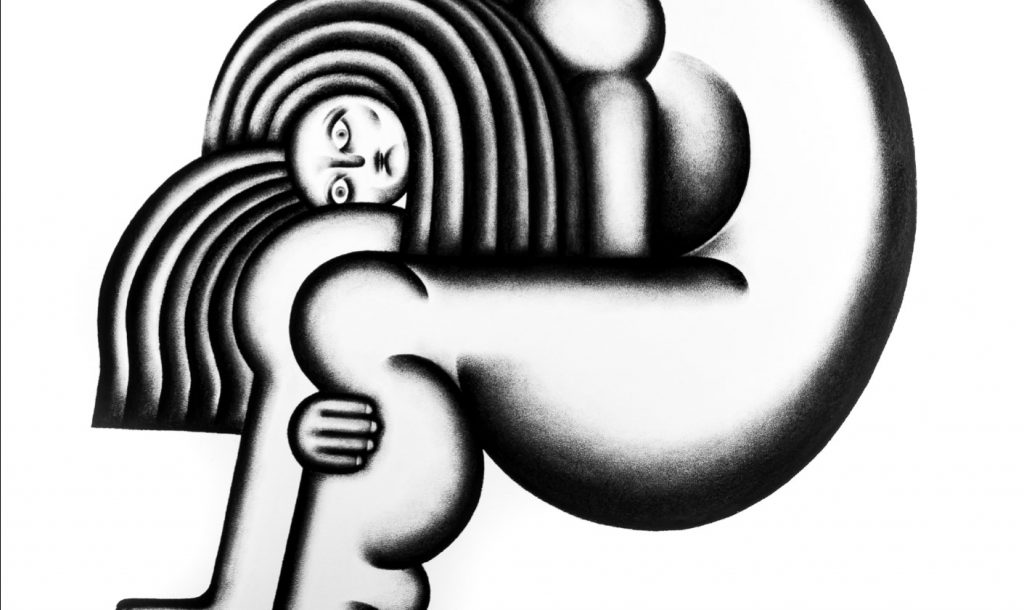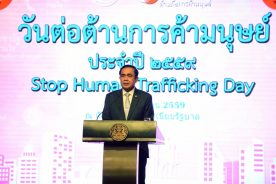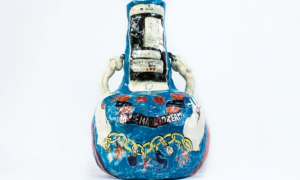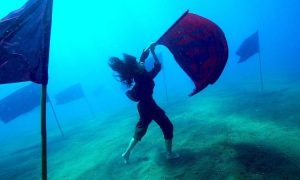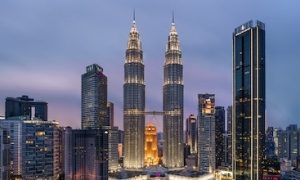Pieces from Berlin: Bussaraporn Thongchai
27 MARCH — 24 APRIL 2021
16 Albermarle Project Space, Sydney
An exhibition dedicated to all the women who immigrated from war, poverty and gender inequality in their motherland
In 2015 Thai artist Bussaraporn Thongchai relocated from Bangkok to Berlin. Once settled she began working in a small shelter home providing services for migrant women from Africa, Southeast Asia and Eastern Europe who had been the victims of human trafficking and the sex trade.
Pieces from Berlin is the outcome of three years in the shelter, showing works that document the women’s stories and experiences as they passed through refugee case procedures and began rebuilding an identity for themselves. As a migrant herself, struggling to learn a new language and find a place in a new country, Bussaraporn connected with these women and what they were experiencing and feeling.
Her large, stylised drawings in black pastel on paper starkly illustrate the women at various stages of their journeys – pregnant, hungry, homeless, bearing the burden of unpaid domestic labour, travelling with a small child, always conscious of being different and an outsider, a target of racial vilification, a slave.
The artworks are set in the Ban Ying Women’s Shelter, “Ban Ying” being the Thai phrase for house of women. It was founded in 1988 when a group of social workers realised that increasing numbers of Thai women who were working as prostitutes in Berlin were not doing so of their own accord but were being forced to do so. Escape for these trafficked women was more or less impossible because there was no safe place for them to go where they would be out of reach of the pimps and traffickers.
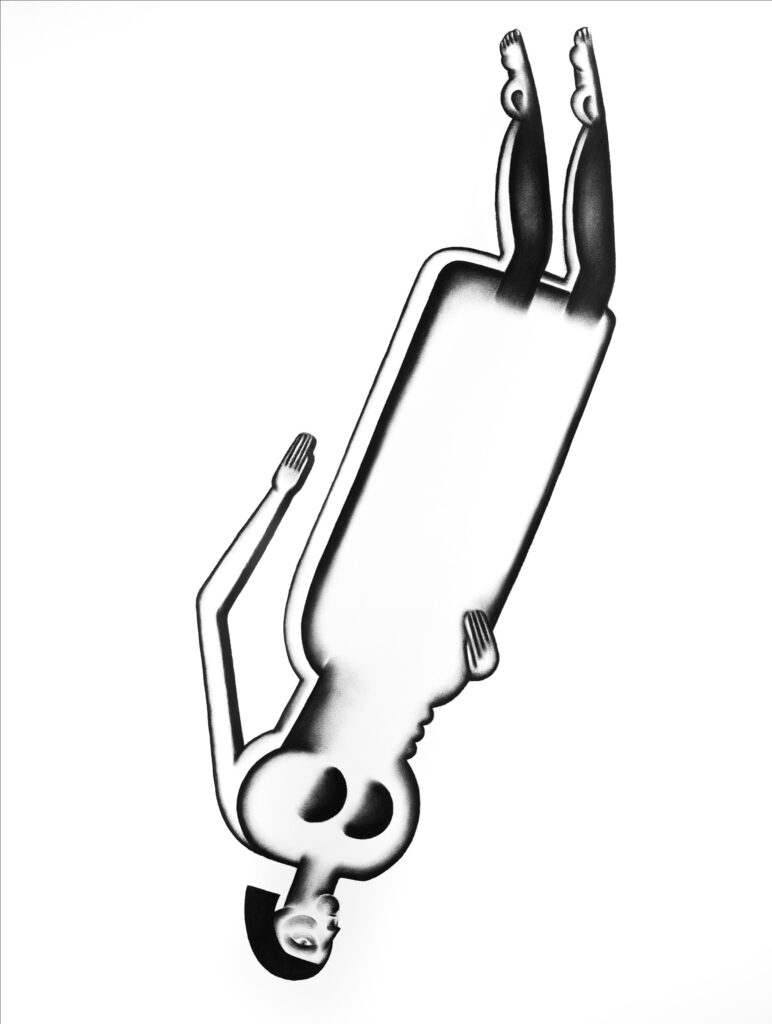
Bussaraporn Thongchai
A Young girl from Vietnam 2020
drawing on paper, 150 x 118 cm
Her experiences as a language mediator in Ban Ying influenced Bussaraporn’s thinking and her art. Her focus broadened from an earlier, more personal interest in gender, sexuality and relationships to a concern for the women she was working with, and a desire to use her art to bring their plight to a wider audience.
Bussaporn’s artist statement speaks of the confluences between her own experiences of dislocation in Germany and the enormity of the challenges her clients faced:
“An anonymous shelter hiding in a normal residential building. It is a place where my Self-Observation Process began intensively and continuously. There is a long narrow hallway which leads you to many separate rooms on each side. Behind their doors are the several lives of women and children who experienced violence, forced labour and sexual exploitation. Well, but here in this house we call them ‘Clients’.
They came from different countries, speak different languages, have different backgrounds and believe in different gods. I observe them and see distinctions and similarities I can relate to. I see the difficulties they have in getting along with the unknown culture and social system, trying to adjust, to compromise with themselves and with the others, tackle obstacles and face prejudice and discrimination. Simultaneously, they have to recover both physically and mentally after their traumatic experiences.
For someone from a third world country like me, it is hard to believe that these things happen in Germany, a developed country and a country that sees itself as an exemplary democracy. At the same time, it’s also a source, transit and destination country subject to trafficking in people, and where the number of reported cases of racial discrimination is still continuously increasing. In this sense, the trauma doesn’t seem to go away but double.
Slavery in seafood industry just one part of a broader problem.
Thailand must end trafficking of all migrant workers
While the ethical and political questions are constantly and often fiercely being discussed and reflected outside the shelter home, I still accompany these women and their children everywhere as usual. My self-observation doesn’t seem to be any less but expands in many directions. The state of being nobody, neither an artist nor whoever I was before, has transformed me into being just a human who wants to approach the basic needs and at the same time fight for my rights and the dignity of being a human, the same as you and others.
Before I started to work on this series and brought them back to Thailand in 2017, I asked myself: “What would happen if I bring all these stories back to where I come from? The place that I’m not able to stop looking at and thinking of. If a small piece of the Berlin Wall can be sold as a tourist’s souvenir, I too can bring back these stories I collected, as pieces from Berlin”
The first iteration of Pieces from Berlin was presented at ARDEL’s Third Place Gallery, Bangkok in March 2018.
Six were subsequently purchased by the Bundeskunstsammlung (Federal Art Collection) of the Federal Republic of Germany. The six remaining works are being presented at 16albermarle Project Space along with six new works produced by the artist in 2020.
The artist: Born in 1985, Bussaraporn Thongchai is a Berlin-based Thai artist known for using her life events as part of her art practice. Drawing on her childhood experiences in a patriarchal family, Bussaraporn questions gender inequality in her society and illustrates this through provocative drawings and paintings. More recently she has expanded her personal practice by addressing broader socio-political issues. She has had six solo exhibitions since 2010 and her work has been included in group exhibitions in Singapore, Hong Kong, the UK and Australia. She was included in the Bangkok Art Biennale Escape Routes 2020.
The curator: Haisang Javanalikhikara studied media arts, contemporary art and curatorial practice for five years in the UK. Returning to Bangkok she worked at Bangkok Art and Culture Centre from 2012-2018, while studying for her DFA from Chulalongkorn University. In 2019 she was appointed a lecturer at Chulalongkorn University, where she’s a director of her faculty’s gallery and co-learning space CU Art4C, founder and editor-in-chief of the multimedia e-magazine Teleaesthetics (teleaesthetics.net) and currently developing the first Master of Arts in Curatorial Practice degree to be offered in Thailand.
 Facebook
Facebook  Twitter
Twitter  Soundcloud
Soundcloud  Youtube
Youtube  Rss
Rss 